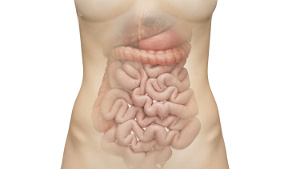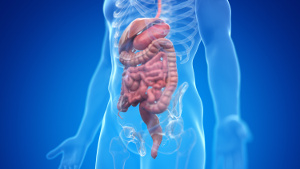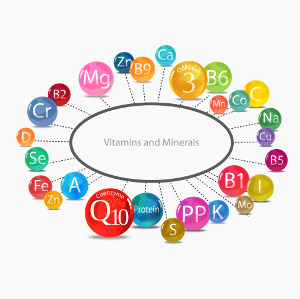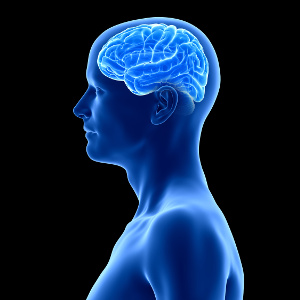- and vice versa
 All the different B vitamins are of vital importance to our energy levels, nervous system, skin, hair, and health in general. Our daily diet is the primary source of the vitamins but the intestinal flora is able to synthesize, consume, and compete for vitamin B in the host. Interactions between the body and the gut flora is therefore important for how we absorb and utilize the different B vitamins. On the other hand, lack of B vitamins or supplementation with B vitamins can also affect our gut flora, according to a review article that is published in Frontiers in Nutrition.
All the different B vitamins are of vital importance to our energy levels, nervous system, skin, hair, and health in general. Our daily diet is the primary source of the vitamins but the intestinal flora is able to synthesize, consume, and compete for vitamin B in the host. Interactions between the body and the gut flora is therefore important for how we absorb and utilize the different B vitamins. On the other hand, lack of B vitamins or supplementation with B vitamins can also affect our gut flora, according to a review article that is published in Frontiers in Nutrition.
 Choline is one of the B vitamins and is necessary for our central nervous system, energy turnover, lipid metabolism, and many other functions. It appears to be a somewhat forgotten nutrient, and science now links choline deficiency to Alzheimer’s disease and cardiovascular diseases, according to a study that is published in the journal Aging Cell.
Choline is one of the B vitamins and is necessary for our central nervous system, energy turnover, lipid metabolism, and many other functions. It appears to be a somewhat forgotten nutrient, and science now links choline deficiency to Alzheimer’s disease and cardiovascular diseases, according to a study that is published in the journal Aging Cell.
 Most people have experienced a normal headache, while migraines are far more complex. Although the pain can be caused by a number of factors, essential nutrients such as B vitamins, vitamin D, magnesium, fish oil, and coenzyme Q10 may play a vital role according to a review article that is published in Current Pain and Headache Reports. The authors describe how certain nutrients affect underlying mechanisms that may prevent or mitigate different types of headaches.
Most people have experienced a normal headache, while migraines are far more complex. Although the pain can be caused by a number of factors, essential nutrients such as B vitamins, vitamin D, magnesium, fish oil, and coenzyme Q10 may play a vital role according to a review article that is published in Current Pain and Headache Reports. The authors describe how certain nutrients affect underlying mechanisms that may prevent or mitigate different types of headaches.
 Irritable bowel syndrome is a widespread condition that is characterized by pain and gastrointestinal discomfort with varying degrees of diarrhea and constipation. There can be a number of underlying causes, but diet plays a major role. Also, there is evidence that being deficient in B-vitamins, vitamin D, magnesium, calcium, iron, and zinc may be a contributing factor. In addition, strict dieting as part of the disease management may result in nutrient deficiencies, according to a review article that is published in Gastroenterology and Hepatology.
Irritable bowel syndrome is a widespread condition that is characterized by pain and gastrointestinal discomfort with varying degrees of diarrhea and constipation. There can be a number of underlying causes, but diet plays a major role. Also, there is evidence that being deficient in B-vitamins, vitamin D, magnesium, calcium, iron, and zinc may be a contributing factor. In addition, strict dieting as part of the disease management may result in nutrient deficiencies, according to a review article that is published in Gastroenterology and Hepatology.
 Biotin, one of the B vitamins, is essential for numerous metabolic processes, and a biotin deficiency may be associated with inflammatory bowel disease (IBD). According to a new study that is published in Nutrients, a biotin deficiency can also have a negative impact on the intestinal flora and result in a suppression of symbiotic bacteria and a replication of harmful, dysbiotic bacteria. The scientists say that a disrupted gut flora caused by a biotin deficiency may contribute to inflammatory bowel disorders.
Biotin, one of the B vitamins, is essential for numerous metabolic processes, and a biotin deficiency may be associated with inflammatory bowel disease (IBD). According to a new study that is published in Nutrients, a biotin deficiency can also have a negative impact on the intestinal flora and result in a suppression of symbiotic bacteria and a replication of harmful, dysbiotic bacteria. The scientists say that a disrupted gut flora caused by a biotin deficiency may contribute to inflammatory bowel disorders.
 There are around 750,000 people in Denmark who take several medical drugs per day, and the number of users is on the rise. What many people are unaware of is that different drugs can disrupt the body’s ability to absorb or utilize one or several nutrients, especially things like B vitamins, vitamin C, vitamin D, vitamin K2, magnesium, potassium, calcium, zinc, iron, and coenzyme Q10. It is therefore vital to get sufficient amounts of the mentioned nutrients to reduce the risk of adverse effects.
There are around 750,000 people in Denmark who take several medical drugs per day, and the number of users is on the rise. What many people are unaware of is that different drugs can disrupt the body’s ability to absorb or utilize one or several nutrients, especially things like B vitamins, vitamin C, vitamin D, vitamin K2, magnesium, potassium, calcium, zinc, iron, and coenzyme Q10. It is therefore vital to get sufficient amounts of the mentioned nutrients to reduce the risk of adverse effects.
 Metabolic syndrome, which is an early stage of diabetes, is spreading like a bushfire. This condition is characterized by overweight, hypertension, hypercholesterolemia, and disrupted blood sugar metabolism. The diet plays a major role, and scientists have found a direct link between the intake and serum levels of vitamin B6, folic acid (vitamin B9), and vitamin B12, according to a large American population study that is published in JAMA Network Open. The authors also address how these B vitamins can help improve the glucose metabolism and prevent metabolic syndrome.
Metabolic syndrome, which is an early stage of diabetes, is spreading like a bushfire. This condition is characterized by overweight, hypertension, hypercholesterolemia, and disrupted blood sugar metabolism. The diet plays a major role, and scientists have found a direct link between the intake and serum levels of vitamin B6, folic acid (vitamin B9), and vitamin B12, according to a large American population study that is published in JAMA Network Open. The authors also address how these B vitamins can help improve the glucose metabolism and prevent metabolic syndrome.
 Glioblastoma is a the most common type of brain tumor and is very aggressive. Existing therapies are not all that effective and most people die within a few years after being diagnosed with the disease. It is essential to have more focus on prevention, and diet plays a major role. According to a Chinese population study, vitamins B1, B2, B3, and B9 (folic acid) are associated with a reduced risk of developing glioblastoma. The scientists mention the different B vitamins and their role in brain health and cancer prevention and stress the importance of knowing about the factors that inhibit the body’s uptake and utilization of these vitamins.
Glioblastoma is a the most common type of brain tumor and is very aggressive. Existing therapies are not all that effective and most people die within a few years after being diagnosed with the disease. It is essential to have more focus on prevention, and diet plays a major role. According to a Chinese population study, vitamins B1, B2, B3, and B9 (folic acid) are associated with a reduced risk of developing glioblastoma. The scientists mention the different B vitamins and their role in brain health and cancer prevention and stress the importance of knowing about the factors that inhibit the body’s uptake and utilization of these vitamins.
 Type 2 diabetes is spreading like a bushfire and is the major cause of vision loss, kidney failure, heart attacks, strokes, and leg amputations. Many people have insulin resistance, the early stage of type diabetes that is associated with fatigue, untimely hunger, and increasing weight. The diet plays a major role and according to a new review article that is published in Human Nutrition and Metabolism, various B vitamins, vitamin D, vitamin K, vitamin E, and zinc influence insulin resistance and diabetes treatment. Previous research has also shown that chromium and magnesium play a role in insulin resistance and blood sugar regulation.
Type 2 diabetes is spreading like a bushfire and is the major cause of vision loss, kidney failure, heart attacks, strokes, and leg amputations. Many people have insulin resistance, the early stage of type diabetes that is associated with fatigue, untimely hunger, and increasing weight. The diet plays a major role and according to a new review article that is published in Human Nutrition and Metabolism, various B vitamins, vitamin D, vitamin K, vitamin E, and zinc influence insulin resistance and diabetes treatment. Previous research has also shown that chromium and magnesium play a role in insulin resistance and blood sugar regulation.
 Vitamin B12 is important for the development and function of our central nervous system. In the past decades, science has also found similarities between sclerosis and the neurological symptoms that occur in people who lack vitamin B12. In a new study that is published in Cell Reports, scientists have found the molecular relation between vitamin B12 and the function of supportive brain cells.
Vitamin B12 is important for the development and function of our central nervous system. In the past decades, science has also found similarities between sclerosis and the neurological symptoms that occur in people who lack vitamin B12. In a new study that is published in Cell Reports, scientists have found the molecular relation between vitamin B12 and the function of supportive brain cells.
 Vitamin B3 deserves a lot more attention because of its key role in cellular energy metabolism, the brain and nervous system, our mental health, and our circulatory system. In the cellular powerhouses, we find the derivate form of B3 called NAD, which gives an energy boost. According to a study published in StatPearls, studies suggest that vitamin B3 lowers the risk of Alzheimer’s disease, Parkinson’s disease and other neurological disorders, rheumatoid arthritis, muscle atrophy, and various cancer forms. Many people have an increased need for the nutrient due to factors such as ageing, genetic variations, and poor utilization of the vitamin.
Vitamin B3 deserves a lot more attention because of its key role in cellular energy metabolism, the brain and nervous system, our mental health, and our circulatory system. In the cellular powerhouses, we find the derivate form of B3 called NAD, which gives an energy boost. According to a study published in StatPearls, studies suggest that vitamin B3 lowers the risk of Alzheimer’s disease, Parkinson’s disease and other neurological disorders, rheumatoid arthritis, muscle atrophy, and various cancer forms. Many people have an increased need for the nutrient due to factors such as ageing, genetic variations, and poor utilization of the vitamin.
 All the different B vitamins are of vital importance to our energy levels, nervous system, skin, hair, and health in general. Our daily diet is the primary source of the vitamins but the intestinal flora is able to synthesize, consume, and compete for vitamin B in the host. Interactions between the body and the gut flora is therefore important for how we absorb and utilize the different B vitamins. On the other hand, lack of B vitamins or supplementation with B vitamins can also affect our gut flora, according to a review article that is published in Frontiers in Nutrition.
All the different B vitamins are of vital importance to our energy levels, nervous system, skin, hair, and health in general. Our daily diet is the primary source of the vitamins but the intestinal flora is able to synthesize, consume, and compete for vitamin B in the host. Interactions between the body and the gut flora is therefore important for how we absorb and utilize the different B vitamins. On the other hand, lack of B vitamins or supplementation with B vitamins can also affect our gut flora, according to a review article that is published in Frontiers in Nutrition.












 Most people have experienced a normal headache, while migraines are far more complex. Although the pain can be caused by a number of factors, essential nutrients such as B vitamins, vitamin D, magnesium, fish oil, and coenzyme Q10 may play a vital role according to a review article that is published in Current Pain and Headache Reports. The authors describe how certain nutrients affect underlying mechanisms that may prevent or mitigate different types of headaches.
Most people have experienced a normal headache, while migraines are far more complex. Although the pain can be caused by a number of factors, essential nutrients such as B vitamins, vitamin D, magnesium, fish oil, and coenzyme Q10 may play a vital role according to a review article that is published in Current Pain and Headache Reports. The authors describe how certain nutrients affect underlying mechanisms that may prevent or mitigate different types of headaches.

 There are around 750,000 people in Denmark who take several medical drugs per day, and the number of users is on the rise. What many people are unaware of is that different drugs can disrupt the body’s ability to absorb or utilize one or several nutrients, especially things like
There are around 750,000 people in Denmark who take several medical drugs per day, and the number of users is on the rise. What many people are unaware of is that different drugs can disrupt the body’s ability to absorb or utilize one or several nutrients, especially things like  Metabolic syndrome, which is an early stage of diabetes, is spreading like a bushfire. This condition is characterized by overweight, hypertension, hypercholesterolemia, and disrupted blood sugar metabolism. The diet plays a major role, and scientists have found a direct link between the intake and serum levels of
Metabolic syndrome, which is an early stage of diabetes, is spreading like a bushfire. This condition is characterized by overweight, hypertension, hypercholesterolemia, and disrupted blood sugar metabolism. The diet plays a major role, and scientists have found a direct link between the intake and serum levels of  Glioblastoma is a the most common type of brain tumor and is very aggressive. Existing therapies are not all that effective and most people die within a few years after being diagnosed with the disease. It is essential to have more focus on prevention, and diet plays a major role. According to a Chinese population study,
Glioblastoma is a the most common type of brain tumor and is very aggressive. Existing therapies are not all that effective and most people die within a few years after being diagnosed with the disease. It is essential to have more focus on prevention, and diet plays a major role. According to a Chinese population study, 

 "After about one week of taking the Q10 supplement I could feel a huge difference," says 23-year old Alan Piccini, who has been suffering from extreme fatigue and muscle aches ever since he was a child.
"After about one week of taking the Q10 supplement I could feel a huge difference," says 23-year old Alan Piccini, who has been suffering from extreme fatigue and muscle aches ever since he was a child. “Taking capsules with co-enzyme Q10 has freed me of the severe side effects of my cholesterol lowering medicine,” Mrs Franken explains.
“Taking capsules with co-enzyme Q10 has freed me of the severe side effects of my cholesterol lowering medicine,” Mrs Franken explains.